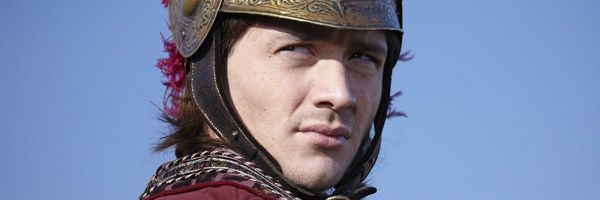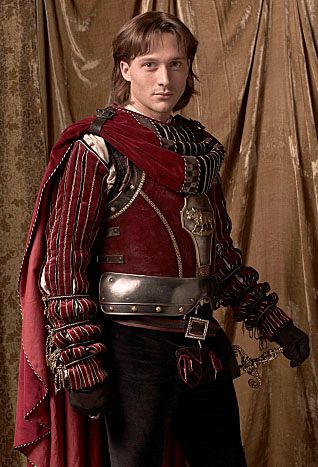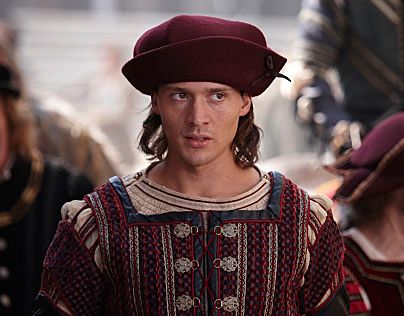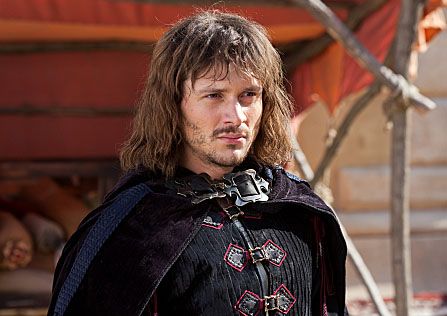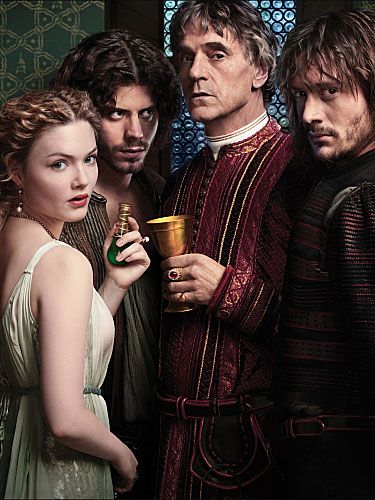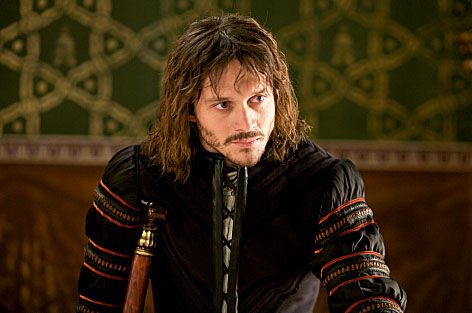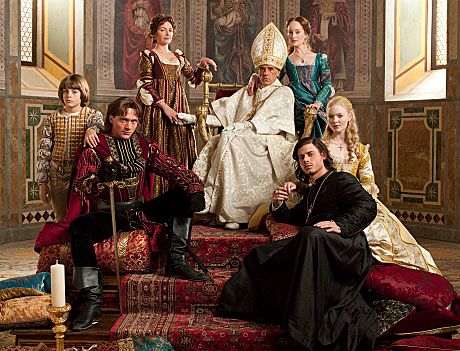The Showtime drama series The Borgias is a complex, unvarnished portrait of one of history’s most intriguing and infamous dynastic families. No matter the outside threats, the biggest problems that Pope Alexander (Jeremy Irons) had to face throughout Season 2 came from inside his own family, most specifically the sibling rivalry between sons Cesare (François Arnaud) and Juan (David Oakes), which came to a head in Episode 9. Please be aware that there will be spoilers, so stop reading now if you don’t want to know.
During a recent exclusive phone interview with Collider, British actor David Oakes talked about the outcome for his character, what it was like to shoot the penultimate scene with François Arnaud, trying to delay the inevitable fate of his character, what he thinks Season 3 might be like now, how it’s been to have such overwhelmingly positive fan support, and working with such an amazing cast. He also talked about where he’d like to go next in his career, and how he ended up as an actor. Check out what he had to say after the jump:
Collider: So, what’s it like to have to throw yourself off of a bridge for your art?
DAVID OAKES: Well, I’ve done worse. It was great, actually. That is my body, going over. The thing about being on a long-running series is that you get to know all the stunt men and the stunt coordinators, and they let you pretty much do everything you want, as long as they trust you. But, going over the bridge was probably easier than dying from syphilis or a gangrenous infection of the leg. It was quite nice.
What was it like to film that scene with François Arnaud? Did it get emotional, on a personal level?
OAKES: It was literally the last thing I shot, that scene. It was the end of a six month shoot, and I knew the end had been coming for awhile, so it was certainly emotional for me to know that it was going to be my swan song. It’s not nice, leaving a job when you’re not ready to. As far as I was concerned, Juan had just gotten very exciting and was being taken out in his prime, in terms of his character. But, it was so bitterly cold. It was early December in Budapest, and we were running five hours over schedule because it was the penultimate day of the entire shoot and we had to make sure that we got it done.
In terms of the journey that he goes through in that scene, because of the opium addiction and because of what he’s saying and because it’s so heartfelt and emotional, for the majority of that speech, it was quite singularly focused upon him. It was this torrent of thoughts rushing out of him that he’d been wanting to say for such a long time. And then finally, in that hug, everything comes to a head. That was quite moving.
But, I’m not sure François will reciprocate that. Through all of that walk, he was so rigid and just preparing himself to do it that he was not really listening to me, I thought, on the day, but intentionally, in character. If he had listened to what I was saying, perhaps Cesare would not have gone through with the act of killing his younger brother, especially when they are apologizing for their bad habits and trying to help them become more comfortable with themselves. It was a very interesting scene. It was definitely truthful, from both of those characters. It was very sad to leave.
When you learned about what the fate of your character would be, did you try to think of suggestions that you could make to keep him around for a bit longer?
OAKES: It kept on getting longer. At one point, I was going to die in Episode 7. And then, it was Episode 8. And then, it was Episode 9. I kept on suggesting things, all the way. As an actor, you don’t want to be seen to be a bit too hands on with the instruction of the drama because you’re too focused on yourself and not on the overall. But, when you know you’re going to die, you’re like, “I’m going to take as much as I can!” There’s the scene with myself and Jeremy [Irons] and the dagger which I hold to my throat, and that was a scene that I really fought for. I was determined to have a proper confrontation. I really wanted to threat Jeremy with the dagger and have him up against the wall with it, but they thought that was a bit too far, so we subverted it and made it a slightly more complex arrangement of risk. There were a lot of scenes like that where the focus of the scene was twisted to be much more family centric. It wasn’t simply about the eventual confrontation, but all about the richness of this twisted family make-up.
What do you think Season 3 will be like without Juan’s presence?
OAKES: Oh, I think The Borgias will be really boring and people will just have to watch whatever I’m doing. No. On the contrary, I think they’re in a brilliant and exciting position. If they take all of the intrigue and mystery that they made through Juan and through, subsequently, his removal from the family, then they’ve got this huge playground of stuff. The only mistake they could make is just to move on and go, “Right, what’s next?” It really got juicy. Season 1 was about setting up the family, and Season 2 was about, once you already know them, you can then start to dismantle them and show all the richness of all the relationships. Hopefully, Season 3 will deal with it, in that way, rather than just putting them in new situations. It’s not a soap. It’s not just about seeing what they’re doing next in their lives. It’s an intricate piece of family drama and political intrigue, at best. It has to keep asking questions. It can’t just say, “Okay, here’s a different war, and here’s someone with a different sexual partner.” There’s a lot of characters they can play with, if they choose to. It should be quite exciting.
What’s it been like to receive such an overwhelmingly positive fan response for your work on the show, especially when you’re playing someone who’s not always likeable?
OAKES: It makes me worried. It makes me imagine that the world is in such a state of disrepair that they are prepared to like psychopathic rapists with sexually transmitted diseases. No. I’m hugely flattered. I really am. I’ve been very well supported by fans, over the last two years, with The Borgias, and it’s been quite overwhelming because I wasn’t expecting it. I’m playing, what’s on paper, quite an unlikeable character. I don’t try to make him likeable. I try to just make him human. It goes beyond that. They get a lot of sympathy for him, as well. It’s quite exciting, considering.
When you think back to when you signed on for the show, what was it that initially attracted you to the project and the character, and how differently did Juan turn out from what you expected, when you started on the show?
OAKES: He could not have turned out to be more different. I had read Episode 1, and Episode 1 alone, when I took the job. What excited me about the job was playing in another big period piece. I had just come off Pillars of the Earth and was well up for doing another big epic, horse-riding, sword-fighting, costume drama, which is what I love to do, but all I read about him, in that first brief, was that he was this arrogant, spoiled kid who was a bit of a brat. He was considerably younger than I was, so I was a bit surprised they went for me. They said, “It will get juicier. He’ll have a bit of a fight with his brother.” And then, over the season, that never really materialized.
I knew they were holding it back. I knew they liked what I was doing, so they wanted to make it a big deal in Season 2. But, my audition scene was the scene in Episode 3 of the first season, when he’s on the horse with the sword and he’s getting his portrait painted, and he’s just being a brat. If you compare that scene and the way he looks, with his fresh face and his weird mullet, to the last few scenes where he’s ranting at his brother and ranting at his sister and insulting his mother, and then he’s in an opium den and he’s afraid and shivering and crying with no one talking to him, and then he’s gone, that’s a bigger journey than I think anyone else has done on that show. That’s an absolute treat. I couldn’t have asked for that, and I didn’t expect that. I’m very, very happy, indeed.
Once you get a feel for a character through the first season, and then have to play such a dramatic descent for him, were there times that you wished you could have changed his actions to effect his outcome?
OAKES: I don’t think so. One of the things that I’ve always said about Juan is that every action that he does has been heartfelt and genuine. When it was the war against the French in the first season, he was there and he was going to go to war, even though he knew he was going to die. He saw them getting ripped apart, but he was there and he was going to do it. I don’t think there’s anything that he’s done which was through general cowardice. In terms of his survival, he died how he lived, and that’s laudable, in itself. As an actor, if I simply wanted to preserve him longer, then I probably wouldn’t have dangled the baby over the edge. Be nicer to Lucrezia (Holliday Grangier). That’s basically it. If you don’t want Cesare to come after you, then just treat her really well. That’s the secret to surviving the Borgia Renaissance, I guess.
What was it like to work with these actors in this amazing cast?
OAKES: It was incredible! Especially as a British actor, most of the cast were huge people within the British stage and screen. Whether it was Jeremy Irons or Steven Berkoff or Gina McKee or Julian Bleach, or Derek Jacobi back in the beginning, those were actors that I’d grown up with. The cast has continued to be one of the most incredible things about the show. Personally, I have enjoyed working with Jeremy, in my one-on-one scenes. There was one in the first season, and then a mirror of that in the second season with the dagger.
I loved those scenes with him where it wasn’t about exposition and it wasn’t about the plot, but it was purely about the twisted father-son relationship that they had. Those were the most enjoyable bits of screen acting that I’ve ever done because they were so still and so confrontational. He’s an Oscar winner and he’s in one of my favorite films. I’m a massive David Cronenberg fan, and Dead Ringers is one of my favorites of his. To think that you’re alongside Jeremy, when he’s done something like that, is just quite immense and a very great privilege for somebody who’s not been acting for terribly long.
Where do you go from here? Do you have a dream role that you’d love to do?
OAKES: I don’t know. I’m open to suggestions. That’s the weird thing. I don’t really have dream roles. Every single time I’ve gotten a great job, it’s far exceeded my expectations and my dreams, so it’s fruitless to start imagining. What’s been quite intriguing is where people have been deciding to place me. I’m not actually a psychopath. I don’t look evil. People don’t normally want to put me in the same kind of things afterward, so I’m looking forward to people taking a few risks and hopefully seeing me as the character actor that I think I am. I have got a little bit of tele coming up soon, and then who knows what’s after that. We’ll see.
What original interested you in acting? Did something inspire you to do it, or did you just always want to do this?
OAKES: I never wanted to do it. No. I’ve always acted. I was in a youth theater and I ran the drama society at university, and all of that kind of stuff, but I was more interested in directing and producing. I’m a bit of a control freak and I like making stuff. The acting stuff was the other side of it. If you wanted to direct a play, you had to get to know the people. You’d put yourself in a play and get to know the system and learn how to be directed, and then you could be a director. So, I’ve just always done it. It was always a hobby. The funny thing was that when I started to get paid to do it as a professional job, I lost my hobby. I don’t know what to do. I have to take up something else now.
Did you have a moment when you realized that you could actually have a career as an actor?
OAKES: Yeah, but you also never really have it. You work for a bit, and then the job ends ‘cause you get thrown off a bridge. And then, you suddenly don’t have a career and you have to wait for the next bit to come along. It’s the most strange profession in the world. It has the highest highs. It really does. You’re in the public eye and you get treated better than royalty, and then you’re dropped down to earth with nothing. You may not have any money for rent, and you have no friends because they all think you’re big and famous now. That’s just hypothetically speaking because I’ve got a million friends. It’s great! I love it to bits, but it’s highly bizarre, especially when you’re playing a psychopathic rapist with various diseases.

